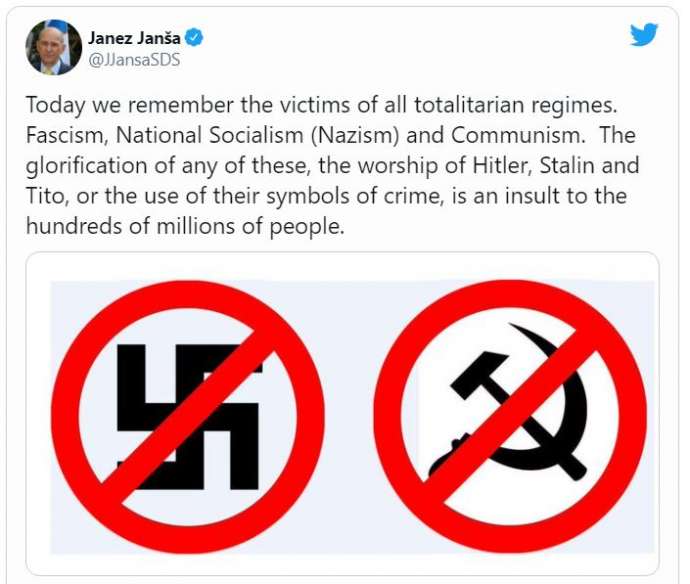STA, 23 August 2021 - PM Janez Janša and parliamentary Speaker Igor Zorčič marked Europe-wide Day of Remembrance for the victims of all totalitarian and authoritarian regimes on Monday, warning against glorification of Nazi and other totalitarian regimes' symbols. Zorčič called for prosecution of such acts, which he deems extremely dangerous and inadmissible.
Addressing an international conference on transition processes in Central and Eastern Europe marking Black Ribbon Day in Ljubljana, Janša stressed that unless the society learned from history it would be condemned to repetition.
He noted that it took more than 15 years for the resolution based on which Black Ribbon Day is marked to be adopted. He also thinks a lot more work will be needed to achieve national reconciliation.
However, at least the memory of the past has been preserved, he stressed. "Today, nobody in Slovenia can say they do not know or do not have the opportunity to know the entire truth, all aspects of events during all totalitarian regimes under which Slovenians have suffered," he said.
The prime minister also expressed concern about the attitude to totalitarian, criminal regimes. "Today, when we remember victims of totalitarian regimes on European soil, let's not look only back but also forward. If we are not capable of learning anything from history, we'll be condemned to repetition," he warned.
Speaker Zorčič said in his message on Black Ribbon Day that even though it seemed that the period of peace and economic progress after the Second World War had brought catharsis to European nations and an understanding of the evil that totalitarian regimes bring, it was clear today that Europe had still not come completely to terms with its totalitarian past.
"Worse yet, recently historical criminals, their totalitarian ideas and despicable actions are increasingly being glorified, while intolerance to those who are different and think differently is strengthening," Zorčič warned.
The current situation is a warning how extremely thin and fragile is the borderline between normality and totalitarianism, he said.
The crisis situation brought about by the Covid-19 epidemic creates the conditions for hate speech that is spreading particularly aggressively on social media, the speaker noted.
"In this situation adding fuel to the fire by irresponsible individuals, including politicians, is particularly dangerous. Any glorification of Nazism and totalitarian symbols, even only to get public attention, is extremely dangerous and inadmissible, yet it is becoming increasingly frequent, so it should be prosecuted in Slovenia as well," Zorčič said.
Tomaž Ivešić, director of the Study Centre for National Reconciliation, which hosts today's conference in parliament together with the National Council and Foreign Ministry, said that Slovenia had so far made some important steps towards reconciliation, correcting injustices and punishing human rights violations in totalitarian regimes.
He noted that almost 36,000 decisions had been issued to political prisoners and victims of post-war violence and their relatives based on which EUR 127 million in damages had been paid out.
However, he added, one problem was that so far no one had been convicted of any crimes committed during the Second World War, and that the process of denationalisation was still not completed.
National Council president Alojz Kovšca said that the term reconciliation was being abused in a political sense. He thinks it should be made clear publicly that reconciliation meant letting go of resentments referring to the past and not giving mandate for illegitimate obtaining of privileges for anyone.
Kovšca also warned of the "aggressive political discourse", including on social media.
Victims of totalitarian regimes will be remembered today as wreaths will be laid at the Monument to the Victims of All Wars in Ljubljana's Congress Square and in front of the US Embassy. A mass will also be celebrated at the Ljubljana cathedral by Archbishop Stanislav Zore, which will also be attended by Janša.
Slovenia and Europe mark today the international day of remembrance for the victims of totalitarian regimes, specifically Stalinist, communist, Nazi and fascist regimes. The European Parliament set 23 August as Europe-wide Day of Remembrance for the victims of all totalitarian and authoritarian regimes in 2009. Slovenia has been officially marking the day since 2012.
23 August was chosen as the date of the signing of the Molotov-Ribbentrop Pact, a 1939 non-aggression pact between the Soviet Union and Nazi Germany.






